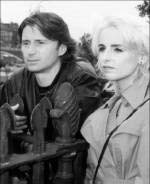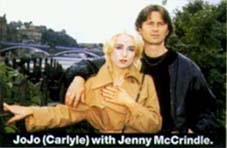 Robert
Carlyle and Jenny McCrindle star in Looking After Jo Jo
Robert
Carlyle and Jenny McCrindle star in Looking After Jo Jo Robert
Carlyle and Jenny McCrindle star in Looking After Jo Jo
Robert
Carlyle and Jenny McCrindle star in Looking After Jo JoThe Times January 10 1998 VISION Monday's Choice
The Times January 13 1998 TELEVISION
Hopes are high, in a different way, for the remaining three episodes of Looking After Jo Jo (BBC2). Robert Carlyle is never less than mesmerising, but last night's opening instalment was like watching Marco Pierre White struggling to make a feast out of baked beans and tinned Spam. Let's hope Carlyle's larder gets slightly fuller by next week.
The Times January 31 1998 Monday's Choice Television
LOOKING AFTER JO JO BBC2, 9pm.
The final part of Frank Deasy's bleak tale of
drug dealing in 1980s Edinburgh confirms the initial impression of a project that
scores highly on script, acting, direction and ambience, but has the great problem of
empathy. In the classic Hollywood gangster films, of which this has echoes, we
could allow ourselves to enjoy the energy and presence of the Cagney and Bogart
characters because they were presented as society's victims. And we knew they
would meet a bullet in the final reel. But Robert Carlyle's heroin dealer, despite a
screen-stealing performance, has been difficult to take because the moral framework
is lacking. To the end the scenario offers little to explain his actions and or to excuse
them. Tonight this behaviour is not just about drugs but carrying out a vicious
murder and forcing somebody else to take the rap

The Guardian Thursday January 8th.
Leave Me Alone - Begbie won't stand for it.
Robert Carlyle, star of Trainspotting and The Full Monty is being hounded
out of Scotland - by a bunch of journalists. Lawrence Donegan meets a man
under siege.
He still lives in Glasgow's West End, less than a mile from the street in Maryhill where he was brought up by his father. "It's important to me to be here, because most ofthe stuff I do reflects the life around me. It keeps me grounded, it keeps me sane. Even London is too much for me," he says.
Carlyle didn't have to travel far to play his latest role, as drug dealer Jo Jo McCann in the series Looking After Jo Jo.
Written by Frank Deasy, the BBC's four-part series is set in 1982 and traces the formative years of the Edinburgh's heroin explosion. It has a great soundtrack of Jam songs and some fine performances from the likes of Jenny McCrindle and Kevin McKidd.
Looking After Jo Jo bears a superficial resemblance to Trainspotting. "Hey man, it's just like Hill Street Blues, one character enthuses as he watches his mate shoot up for the first time but it doesn't have the movie's ambivalence towards drugs. And, like most of Carlyle's work, politics is never far beneath the surface.
"I wanted to do the piece because it seemed to concentrate on a period that has largely been passed over, the early eighties. When I first started working as a painter and decorator, this was the kind of stuff that was going on around me," he says. "It makes it easier for me to live my life as an actor if I can speak in a coherent way about the stuff that I choose to do. There would be nothing worse for me than to do a picture that I didn't have anything to say about. If I thought it was going to be like Trainspotting, I would never have done it."
The series was filmed mosthly on Edinburgh's Sighthill estate, which made life a whole lot easier for Carlyle. "It's a world that I know. When we got to Sighthill, it was just a case of talking to the guys there. It was almost as though Begbie was their mate, and it was very easy for me to be accepted. It had same atmosphere as the place I was brought up in."
Despite a cortege-paced narrative Looking After Jo Jo has enough wit and moral backbone to take its place alongside other recent gems in Scottish drama. For his part, Carlyle believes it to be one of the best projects he's ever been involved with. However, it's likely to be his last in Scotland for a while at least.
Looking after Jo Jo episode one first screened on Monday 12 January 1998 on BBC2.
From an interview with Tom Lappin published in Scotland on Sunday on 4 January 1998:
Now as drug dealing lowlife Jo-Jo McCann in BBC Scotland's new drama Looking after Jo Jo, Carlyle is playing to his strengths. JoJo is vulnerable, prone to neurosis about his relationship with his dead father, capable for falling for a teenage Marilyn Monroe impersonator, yet not averse to dressing up in a giant rabbit costume and laying into his enemies with a razor (Carlyle could fill a wholeCV with stabbing scenes alone).
"Looking after Jo Jo was far more psychologically draining than The Full Monty" he says. "There's more toThe Full Monty than meets the eye, obviously, but something like JoJo is in a different darker mould. That's something I enjoy."
Frank Deasy's script for Looking after Jo Jo shapes up as a kind of Trainspotting prequel, without the distancing coolness. Set in 1982, it sets out to trace the beginnings of Edinburgh's relationship with Heroin in the eighties, and the repercussions of crime and Aids. It will have an impact, not necessarily for the subject matter( as Deasy points out, heroin usage these days has lost it's sensationalist impact), but for Carlyle's portrayal of Jo Jo as one of the heroin trade's first exploiters, and, eventually, victims. Directed by John Mackenzie, who was responsible for The Long Good Friday, it is direct, untrendy, believable.
"By the end of it, it's a terrible spiral that happens withthis guy,"says Carlyle,"If Looking after Jo Jo was a Shakespearian playit would be considered a tragedy, a fantastic beautiful, horrible tragedy. In a sense that's what this is. The redeeming quality in a sense is that it's almost inevitable what's going to happen to this guy. It's human weakness. In the first episode I've tried my best to make him as attractive as possible, as interesting as possible, so that by the time three and four come you think, well there was someone in there originally. As he says at one point, you take your chances in life. He's just taken the wrong chances. In a sense he's as big a victim as anyone else."
Audiences are conditioned these days to perhaps be surprised to see a big screen star like Carlyle back on the tv so soon. The accepted pattern is, once you've conquered the film world,to turn down all small screen offers until you're on the way down. Carlyle doesn't see it that way.
" I don't think anybody expected me to do tv at all this year. I shocked people by being back doing stuff for BBC Scotland. The simple answer is that it was the best script that came in. I was fortunate enough at the time to be given quite a few offers, but the best one just happened to be 200 yards across the road from me. The combination of John Mackenzie and Frank Deasy was tasty." He's experienced enough to appreciate that films, by nature of being 90 minutes of commercially pressured entertainment, involve compromise. Television can allow the sort ofcreative input Carlyle relishes. "I feel with tv you're allowed more freedom. With television theres more time to create something through the episodes. The fact that you're working harder, on the surface seems more difficult, but you get into a way of working where if you're not allowed to stop and breathe and think about it, you just go on instinctively, which is the way I prefer anyway. I becomes a more spontaneous thing. With Begbie, Trainspotting is a 90 minute movie and Begbie has a certain amount of screen time within that. It's about maximum impact in a sense, so the performance is larger than life, bigger than it would normally be. But when you're dealing with a character like Jo Jo McCann you've got four hours to tell the story, so you can relax and back off a little bit. There's much more detail involved, so that gives me much more scope in which to work"